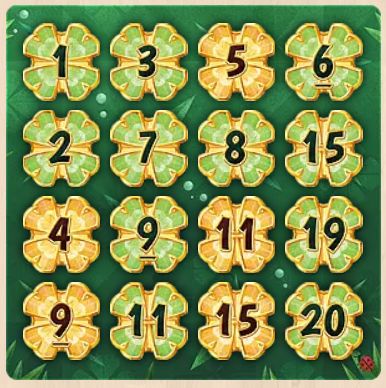This is a documentation for Board Game Arena: play board games online !
Gamehelpluckynumbers: Difference between revisions
Jump to navigation
Jump to search
Sammy McSam (talk | contribs) m (formatting) |
(→Game play: explained play options) |
||
| (4 intermediate revisions by 3 users not shown) | |||
| Line 12: | Line 12: | ||
[[File:Lucky numbers.jpg|Lucky numbers.jpg]] | [[File:Lucky numbers.jpg|Lucky numbers.jpg]] | ||
'''Single Round''' | |||
* The first player to fill their grid wins. | * The first player to fill their grid wins. | ||
==== | ==== Tournament Mode ==== | ||
The game is played multiple times with each player getting a chance to go first. | |||
* The winner earns two points. | * The winner of each round earns two points. | ||
* The other players lose one point for each empty space on their grid. | * The other players lose one point for each empty space on their grid. | ||
Highest total score wins. | |||
== Game play == | == Game play == | ||
* For each player, | * For each player, a set of 20 tiles numbered from 1 to 20 are shuffled together, and each player starts with 4 distinct numbers in a diagonal line. (In the "easy setup" option, the first four tiles for the diagonal spaces are automatically drawn and placed in ascending order from least in the top left to greatest in the bottom right. With the "Michael's setup" option, the first four tiles are drawn one at a time and placed one by one on the diagonal according to the player's choice.) | ||
* At the beginning of each of your turns, you may either draw a random tile or (if there are any | * The remaining tiles (16 from each set) are mixed together in one pot. | ||
* At the beginning of each of your turns, you may either draw a random tile from the pot or take a tile from the table (if there are any). | |||
* You may play the tile you have as long as it is higher than each tile before it in the same row and column, and lower than each tile after it in the same row and column. | * You may play the tile you have as long as it is higher than each tile before it in the same row and column, and lower than each tile after it in the same row and column. | ||
* If you take a tile from the table, you must play it. | * If you take a tile from the table, you must play it. | ||
* If you replace a tile on your grid, or choose to discard a drawn tile, that tile goes onto the table | * To play a tile, you may either play it in an empty space or replace an existing tile on your grid. | ||
* If you replace a tile on your grid, or choose to discard a drawn tile, that tile goes onto the table. | |||
* Normally the next player then takes their turn, but in "Bruno's variant" if you place a tile diagonally adjacent to a tile with the same number then you immediately get another turn. In this way, you can take several turns in a row. | |||
Latest revision as of 01:34, 17 December 2023
Overview
Lucky Numbers is a simple game of luck mixed with thinking ahead.
Objective
- The objective is to make a full grid of 16 number tiles.
- The numbers in each row must increase from left to right, and the numbers in each column must increase from top to bottom.
- You cannot have the same number twice in a row or column.
Example of a completed grid:
Single Round
- The first player to fill their grid wins.
Tournament Mode
The game is played multiple times with each player getting a chance to go first.
- The winner of each round earns two points.
- The other players lose one point for each empty space on their grid.
Highest total score wins.
Game play
- For each player, a set of 20 tiles numbered from 1 to 20 are shuffled together, and each player starts with 4 distinct numbers in a diagonal line. (In the "easy setup" option, the first four tiles for the diagonal spaces are automatically drawn and placed in ascending order from least in the top left to greatest in the bottom right. With the "Michael's setup" option, the first four tiles are drawn one at a time and placed one by one on the diagonal according to the player's choice.)
- The remaining tiles (16 from each set) are mixed together in one pot.
- At the beginning of each of your turns, you may either draw a random tile from the pot or take a tile from the table (if there are any).
- You may play the tile you have as long as it is higher than each tile before it in the same row and column, and lower than each tile after it in the same row and column.
- If you take a tile from the table, you must play it.
- To play a tile, you may either play it in an empty space or replace an existing tile on your grid.
- If you replace a tile on your grid, or choose to discard a drawn tile, that tile goes onto the table.
- Normally the next player then takes their turn, but in "Bruno's variant" if you place a tile diagonally adjacent to a tile with the same number then you immediately get another turn. In this way, you can take several turns in a row.
